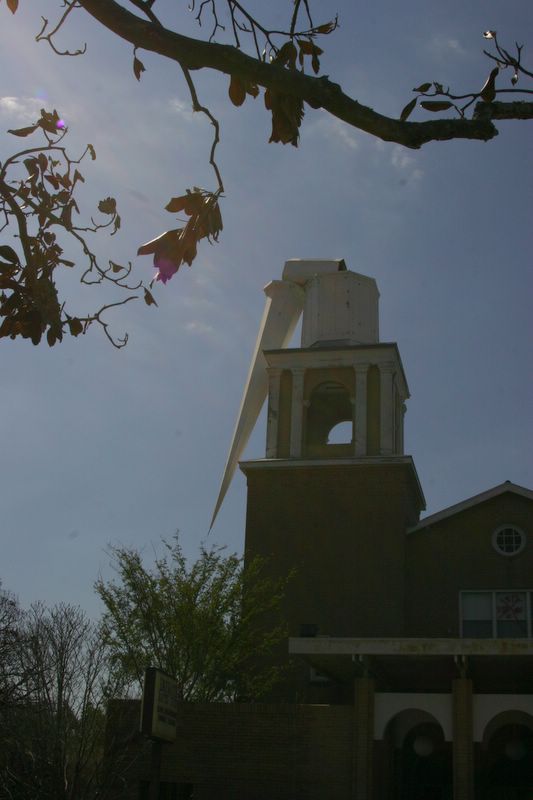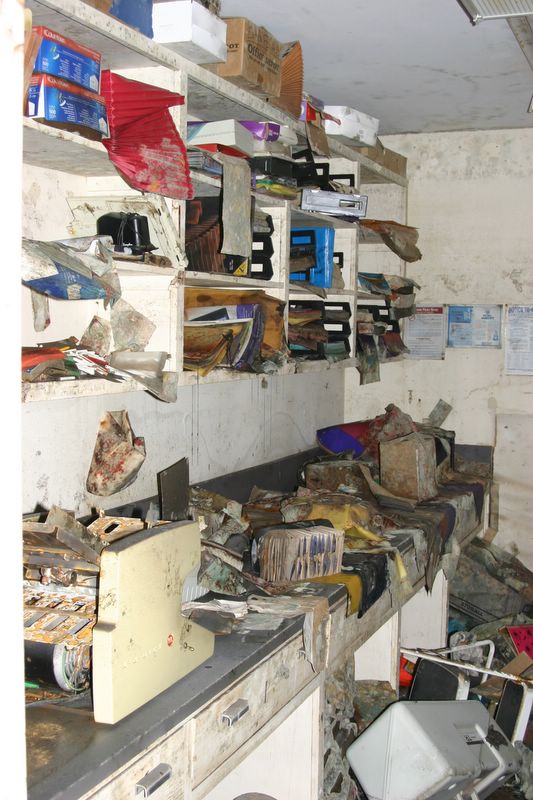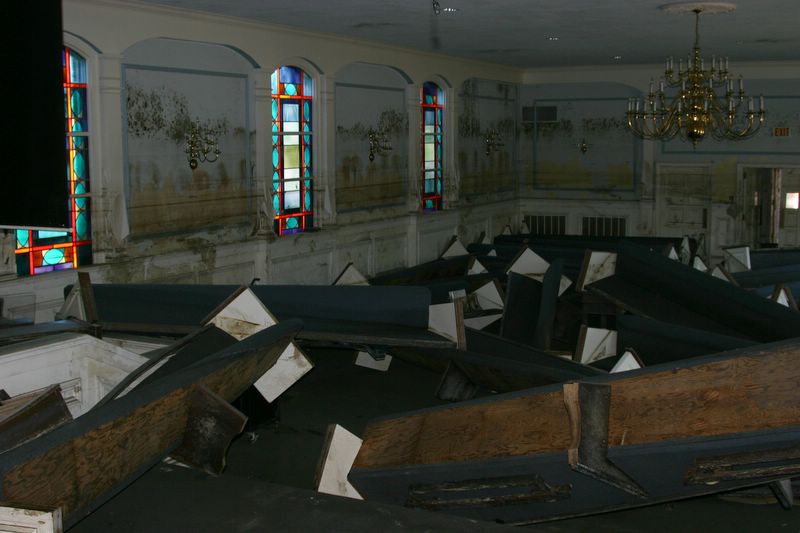Hurricanes Suck...
August 28, 2021 | By: Blaize
I’m sitting in a coffee shop (Brakeman’s Coffee in Matthews, NC) right now as Hurricane Ida is churning in the Gulf of Mexico. While that may seem pretty normal, coffee shops became a staple for me in the post-Katrina world when I lived a gypsy life for about a year. I came here to think… to reminisce… just to reflect in something familiar. Last night, when I looked at the latest projections from Hurricane Ida, everything about Hurricane Katrina came back like a flood. I sat down in front of my computer in an attempt to write this, but the words just would not come, and even now, I am not sure that I have anything profound to say, so if this seems a bit random or pointless, it’s because there is no point – it’s just a dump. Maybe in just a small way, doing a “brain dump” is helpful. Perhaps it would be just beneficial to retell the story…
August 26, 2005, came just like any other day. At the time, I was a year into my master’s degree. I was single at the time, and Friday nights for me were not spent partying or doing anything like that. Typically, I spent Friday nights at the Brantley Center, a homeless shelter in New Orleans. I helped out with a weekday vespers service for those at the center. We would sing songs and have a Bible study. It was simple, honest, and opened. I really enjoyed the company of many of the people I worked with and the residence of the shelter. Some were regulars. In any case, it was just an excellent time to sit and “be” for a moment and listen to people share their stories. I had been a part of this group for about a year and a half by that point. That Friday night was just like many of the dozens before it. Little did I know, though, that it would be the last one in the shelter of a long-standing tradition for decades.
After I returned home for the evening, I was reading the news. We were all keeping an eye on Katrina but were not too concerned about it at the time. It was still several days off and was no big deal at that point—“just” a Category 1 storm, and it was projected to go more to the west. Hurricane evacuations were common in New Orleans. I left for three hurricanes in my four and a half years of living there: Ivan, Katrina, and Gustav. I went to bed that night, not thinking much about it, but when I woke up the next morning, I checked the latest forecast, and New Orleans was squarely in the sights of the storm at that time. That, and they were projecting it to rapidly intensify as it crossed the Gulf of Mexico.
Because of the forecast, I decided that it was time to evacuate, even if the city had not declared a mandatory evacuation. I had messed up with Ivan and left too late. I ended up sitting in traffic for 14 hours with a manual transmission, a mistake I did not want to replicate. I filled up my tank before the gas stations got crazy, packed some clothes and books in a backpack, and grabbed a few books and my computer because I intended to do some school work while away from New Orleans. I figured the Hurricane would pass, and we’d be back in a few days.
Around 10 o’clock, I left. I drove west down I-10 towards Lake Charles, where my grandparents lived. If New Orleans did not call for an evacuation, at least I got to see my grandparents for a couple of days. I had nothing to lose. I was glad I left when I did, though. By the time I got to Baton Rouge, the NHC had released their latest forecast, and Katrina was projected to hit New Orleans directly as a strong Category 3 or weak Category 4. It was projected to intensify to a Category 5 before making landfall, so New Orleans called for a mandatory evacuation. By then, I was an hour and a half ahead of the traffic, so I got to Lake Charles in the typical 2-and-a-half-hour timeframe instead of the 14-hour timeframe of Ivan.
Once there, I unpacked and hunkered down for the storm. The next few days passed more or less normally. On Monday morning, the news was not good. Getting reliable information about Katrina in any case was hard at the time because the city had been inundated, communication was knocked out, and there was no way to get in. There were two things on my mind: what had happened to the city and what had become of my friends down there. (This was before the advent of social media, so it was harder to keep track of everyone.) A few folks I called or emailed. They told me about others. As I learned more and more about the aftermath, I was glad to find out that almost everyone I knew had evacuated safely. That was a huge relief.
What was less sure, though, was the state of the city. News in the days that followed trickled in as footage from helicopters showing a city a dozen feet underwater flooded the airwaves. The dramatic footage of roof-top rescues of people who could not evacuate was burned into the public conscience. While news was spotty, what became clear for everyone is that no one would be going back to New Orleans any time soon.
After a day or two of reeling from the shock of the Hurricane, the relief efforts kicked into high gear. Local churches in the Lake Charles area started marshaling resources. People were opening their wallets and providing all sorts of supplies: food, clothing, basic toiletries, baby items, and anything else one could possibly need. I was in pretty good hands where I was staying. Even though I was an evacuee, I joined a team. We drove a horse trailer temporarily converted to a mobile kitchen to a place just outside of New Orleans in Donaldsonville, Louisiana, that was housing hundreds of Katra victims. We set up the kitchen and provided three hot meals a day for the folks at the shelter. Working the shelter made for long days, but they were very much needed. It was kind of surreal. It felt like an emergency room, and these people were the triaged patients. We heard story after story of what folks had gone through. Some of them had no idea where some of their loved ones were. I remember sitting with one woman for a while. She talked about getting out of the St. Bernard Parish but had no idea where her husband was. She had been unable to contact him. Her was just one of the many stories I heard.
After a few days of this, more permanent arrangements were made. Folks started leaving the shelters and going places where they could stay for a while. I returned to Lake Charles for a day or two, and after that, returned to West Georgia, where I grew up. I started working again and found a place to stay for a few months until some things got clearer. About a month after the storm, school resumed. I was able to continue my coursework online at the time. The school moved its offices to Atlanta, and I was able to take a few classes there during fall break and the semester that followed. I was just one among many other evacuees that landed in West Georgia. I was fortunate to know the folks who set up the West Georgia Relief Foundation to help those impacted by Hurricane Katrina. The foundation helped get food, furniture, clothing, and many other things, to help the victims of Katrina with their basic needs. I connected with the foundation and started volunteering there to help folks like me. Again, as an evacuee myself, I listened to many people tell their stories.
In early October, New Orleans began to open back up. I made a trip down to New Orleans to see if there was anything to salvage. I stayed with a friend in Baton Rouge, then took the drive from Baton Rouge to New Orleans the next day. I lived on the second floor of a building, so my stuff was (more or less) untouched when I got there. After I packed it, I took a drive to see the part of the city where I lived. The most surreal part was driving back to where I went to church. From the outside, the church looked unimpacted by the storm because it was a brick building, other than the steeple that was blown over. The inside, however, was a completely different story. I had found my camera among my things, and it still had a charge on the battery, so I walked through the building and took hundreds of shots of it.
After that, I bid New Orleans farewell and went back to Baton Rouge. I returned home the following day and uploaded the pictures I had taken of the church to the church’s website. These pictures were widely circulated on news networks as an example of what the flood had done, especially among churches. I had how much impact they would have or how much impact the church’s website would have on helping keep the church together in the diaspora. I set up a message board, blog, and gallery on the site to let the church stay connected the best they could. Another church found the websites and “adopted” the church, providing funding and a constant stream of volunteers to help the church and the surrounding community get clean up and rebuild. Also, during this time, the church called a new pastor that was brokered entirely online. I cannot claim credit for “saving” the church. Only God can do that. It was just cool to be a part of that experience that help keep the church together.

Outside of Edgewater Baptist Church

Inside of Edgewater Baptist Church

Inside of Edgewater Baptist Church
During these months that followed, I started dating April, who I would eventually marry. She was a part of the church I attended in New Orleans. I had told her friends I was interested in her before Katrina, but I had no idea where she went or how to reach her after Katrina hit. I got her email address through some internet sleuthing and started emailing, which progressed to phone calls. Eventually, she came to Atlanta in December. We went on our first date to the World of Coke after picking her up at the airport. We also went to Amicalola Falls. We still reminisce about these times, given the unique circumstances of our dating relationship.
Our First Date
Eventually, April moved to Atlanta, and we continued to date during that time even though she lived in North Atlanta and I lived in West Georgia. We burned up I-285 and I-20. I was taking classes in North Atlanta too, so I got to see her on those days. Eventually, though, my school moved back to New Orleans. I took a class the following summer on campus, and they released the fall schedule while I was there. It became apparent to me that I would have to move back to New Orleans to finish my degree. During that time in New Orleans, I found a job and found some living arrangements. After returning to West Georgia, I packed my things and moved back to New Orleans, leaving April in Atlanta. We were back to long-distance dating again like we had started.
Providentially, though, our separation ended about a month later. The organization April was working with had an opening in New Orleans and asked April if she wanted it take it. She accepted, and within a month after I moved back to New Orleans, she was back down there managing a facility that housed volunteer teams helping to rebuild the city.
Over the next few months, life returned to a “new normal” in the city. April and I continued to date and got engaged on December 24, 2006. We were married on June 2, 2007. Our first home together was a small apartment in New Orleans—the city where we both worked, lived, and called home. Our church was back, too, meeting under a tent in the church parking lot. During these days, more and more people returned.
Every year around August 29, I tend to get introspective about an event in my life that impacted me in more ways than one. Some of it was awful. I still carry those scars and memories and hope I never have to relive them. But some of it was amazing—I saw people come together to help others who they had never met. I saw God providentially care for me, my wife, and so many others. I saw God providentially take care of a church that had a diaspora because of the storm. I don’t think I would ever do it again, but I cannot help but reflect on those days even now. Even as I have written this and looked at the pictures, I cannot help but think about those days. It brings back a flood of memories, good and bad, and helps me appreciate where I am, how it has impacted me, and where I am going. As new hurricanes come and go, I will always have a soft spot for hurricane victims. Hurricane Ida is in the Gulf of Mexico now and is threatening folks I know. Hurricane Laura at this time last year greatly impacted my sister and extended family. Many of them lost their homes and had to completely rebuild.
Whenever I see something like Ida, I pause and think for a moment. That was me 16 years ago. I remember at times just sitting there and I would start crying for no reason at all, so it seemed. What was going on in my head was so much more, though. I had just lived through trauma and was experiencing something akin to PTSD. It was less tangible than war for sure, but for so many, including myself, was no less impactful. Remembering those times and reflecting on them though is one good way to process through them.
When I started writing novels, I never had the goal of making lots of money as an author. I am gainfully employed in Infotech, but if I do, then fantastic, because every cent I make from the sales of my books goes to help folks, especially hurricane victims. So, if you enjoy my writing, know that you are help people in need. It’s win-win. 😊